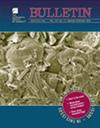东冈瓦纳前寒武纪南麻粒岩地体的地壳演化:锆石U-Pb/Hf年代学的新见解
IF 3.9
1区 地球科学
Q1 GEOSCIENCES, MULTIDISCIPLINARY
引用次数: 1
摘要
南印度前寒武纪南麻粒岩地体的地壳演化史大致介于太古宙晚期和寒武纪之间,具有多期变形、变质和岩浆作用的记录。南麻粒岩地体包括以剪切/缝合带为界的独特地壳块体,这些块体与包括马达加斯加、斯里兰卡、非洲、东高止山脉和南极洲在内的超大陆碎片有不同的相关性。然而,关于南麻粒岩地体内不同地壳块体的组合时间和机制及其与东冈瓦纳地块的联系仍存在很大争议。本研究通过对南麻粒岩地体中部的基片麻岩、片麻岩、花岗岩类和碱性侵入单元进行稳健的锆石U-Pb/Hf同位素数据采集,并与不同东冈瓦南地体的类似数据进行对比,揭示了该地体复杂的地壳演化模式。研究确定了马杜赖地块四个不同的地壳生长时期:(1)新太古代—早古元古代,(2)流纹纪—奥陶系,(3)晚东纪,(4)埃迪卡拉纪—寒武纪。锆石Hf同位素数据分析表明,前两次事件具有明显的幼年岩浆特征,后两次事件则明显与古地壳的强烈改造和重熔有关,没有明显的幼年岩浆输入。我们的新结果与其他冈瓦南地体的现有资料相结合,表明南麻粒岩地体及其相应的冈瓦南碎片具有共同的古元古代祖先,提出了对现有地球动力学模型的修正。本文章由计算机程序翻译,如有差异,请以英文原文为准。
Tracing the crustal evolution of the Precambrian Southern Granulite terrane in East Gondwana: New insights from zircon U-Pb/Hf geochronology
The Precambrian Southern Granulite terrane of south India has a crustal evolution history broadly bracketed between the late Archean and Cambrian with records of polyphase deformation, metamorphism, and magmatism. The Southern Granulite terrane comprises distinct crustal blocks bounded by shear/suture zones that have been variably correlated with supercontinent fragments including Madagascar, Sri Lanka, Africa, Eastern Ghats, and Antarctica. However, the timing and mechanism of assembly of different crustal blocks within the Southern Granulite terrane and its linkages with counterparts in East Gondwana are highly debated. This study aimed to unravel the complex crustal evolutionary pattern of the terrane by generating robust zircon U-Pb/Hf isotopic data from basement charnockites, gneisses, granitoids, and alkaline intrusive units from the central part of Southern Granulite terrane and comparing these results with similar data from different East Gondwanan terranes. The study identified four distinct crustal growth episodes in the Madurai block: (1) Neoarchean−early Paleoproterozoic, (2) Rhyacian−Orosirian, (3) late Tonian, and (4) Ediacaran−Cambrian. Analysis of zircon Hf isotope data revealed that the first two events are marked by juvenile magmatic signatures, whereas the latter two are distinctly associated with intense reworking and remelting of older crust with no significant juvenile input. Our new results combined with existing data from other Gondwanan terranes suggest a common Paleoproterozoic ancestry for the Southern Granulite terrane and its corresponding Gondwanan fragments, proposing a revision to the existing geodynamic models.
求助全文
通过发布文献求助,成功后即可免费获取论文全文。
去求助
来源期刊

Geological Society of America Bulletin
地学-地球科学综合
CiteScore
9.30
自引率
8.20%
发文量
159
审稿时长
4-8 weeks
期刊介绍:
The GSA Bulletin is the Society''s premier scholarly journal, published continuously since 1890. Its first editor was William John (WJ) McGee, who was responsible for establishing much of its original style and format. Fully refereed, each bimonthly issue includes 16-20 papers focusing on the most definitive, timely, and classic-style research in all earth-science disciplines. The Bulletin welcomes most contributions that are data-rich, mature studies of broad interest (i.e., of interest to more than one sub-discipline of earth science) and of lasting, archival quality. These include (but are not limited to) studies related to tectonics, structural geology, geochemistry, geophysics, hydrogeology, marine geology, paleoclimatology, planetary geology, quaternary geology/geomorphology, sedimentary geology, stratigraphy, and volcanology. The journal is committed to further developing both the scope of its content and its international profile so that it publishes the most current earth science research that will be of wide interest to geoscientists.
 求助内容:
求助内容: 应助结果提醒方式:
应助结果提醒方式:


